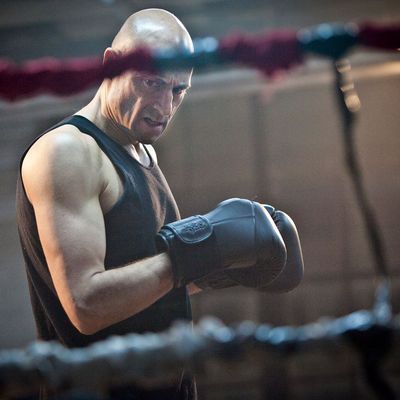
If you watch just one drama about a violent bald man Sunday nights on AMC this month, donÔÇÖt make it Low Winter Sun. If any further evidence were needed that the rugged, anti-heroic white-dude drama is played out, AMCÔÇÖs latest (which premieres Sunday)┬ácould be Exhibit A. As fruitful as this mode of television has been over the past fifteen years, I think itÔÇÖs finished for now. The problem isnÔÇÖt that Low Winter Sun is incompetent, itÔÇÖs that itÔÇÖs essentially a catalogue of cable clich├®s that donÔÇÖt need any more exposure. David ChaseÔÇÖs The Sopranos opened up this vein of pop-culture ore. Over the years it was strip-mined by other dark shows that probed morality by depicting the scheming and suffering of a mostly criminal class: Deadwood, Boardwalk Empire, Sons of Anarchy, and, of course, The Shield, which Low Winter Sun superficially resembles, right down to its Kurtz-skulled protagonist, cop-┬¡corruption story lines, and popcorn-noir stylings. But now the vein is tapped. On paper, scheduling this as the time-slot follow-up to Breaking BadÔÇÖs final eight episodes mightÔÇÖve looked like a brilliant move, but all it does is underline the unrepeatably special mix of qualities that makes Breaking Bad so great: not just the scurvy schemes of Walter White and company, but the domestic drama, financial satire, lively dialogue, and beguiling sense of fun. Low Winter Sun, in contrast, seems to have just one note in its repertoire ÔÇö anxious nihilism ÔÇö and hammers it over and over.
Mark Strong stars as Detroit police detective Frank Agnew. The character is introduced mere minutes before he kills the corrupt partner of fellow cop Joe Geddes (Lennie James), partly to avenge a brutal crime committed against a woman glimpsed in hazy flashbacks. At first this opening seems like an admirable example of dropping the audience right into the middle of things, but once you see all the time that the show has to spend backing up and awkwardly defining the characters and their relationships, it becomes a better example of what happens when you trade shock value for sense. The pilotÔÇÖs director, Ernest Dickerson, treats Strong, James, and the other actors ÔÇö including Breaking Bad scene stealer David Costabile as an internal-affairs investigator ÔÇö as sculptural objects, blasting their lined faces with high-contrast light and arranging them artfully against DetroitÔÇÖs husk-strewn landscape, turning every frame into a poster. ItÔÇÖs annoying, but at least it distracts us from the thin characters and trite situations.
Adapted by Chris Mundy, a writer-producer for Cold Case and Hell on Wheels, Low Winter Sun is based on the same-┬¡titled, narratively similar 2006 BBC program, which also starred Strong but was actually compelling thanks to a more intimate feel and regional details (it was set in Scotland). The AMC remake is so devoid of cultural specificity that it might as well be a missing episode from Sin City. Where his performance in the original had an easygoing, beefy naturalism, StrongÔÇÖs work here is professional yet oddly hollow and vague, as ÔÇ£AmericanÔÇØ performances by Brits often are. There are few jokes, and fewer women. ItÔÇÖs all chiaroscuro and muttering about secrecy and honor. Imagine FXÔÇÖs The Shield without the perversely amusing banter and lively character touches, or a mid-period James Ellroy novel adapted to film but shorn of EllroyÔÇÖs scuzzball joyousness. (ÔÇ£Jack-off dead dirty cop and a chopped-up no-name body, Christ,ÔÇØ growls FrankÔÇÖs superior officer, played by Ruben Santiago-Hudson. ÔÇ£Screw the blue code of silence.ÔÇØ ItÔÇÖs poetry-slam Ellroy: Just add bongos.) If the show were badly directed, photographed, edited, and acted, at least you could have fun laughing at it, but everyoneÔÇÖs working so hard to put across unremarkable material that the best one can manage is a kind of exhausted empathy.
Where do we go from here? Luckily, viewers have plenty of options. This is the richest year for scripted TV drama and comedy since I became a critic over twenty years ago, and, Breaking Bad notwithstanding, the newest-feeling programs havenÔÇÖt gone anywhere near the SopranosÔÇôShieldÔÇôLow Winter Sun school of tortured-and-torturing male-odrama. Shows like this one, the similarly unimpressive Magic City (Starz), and Copper (BBC America) feel like relics from ten years ago, when the very idea of an anti-heroic main character felt new, or new-ish. The real artistic action is happening in mini-series such as American Horror Story and Top of the Lake, and in the made-for-Netflix comedies Arrested Development (season four) and Orange Is the New Black. The games these shows play with tone and structure are more thrilling than the sight of suffering macho guys making other macho guys suffer. More daring, too.
*This article will appear in the August 19, 2013 issue of New York Magazine.


